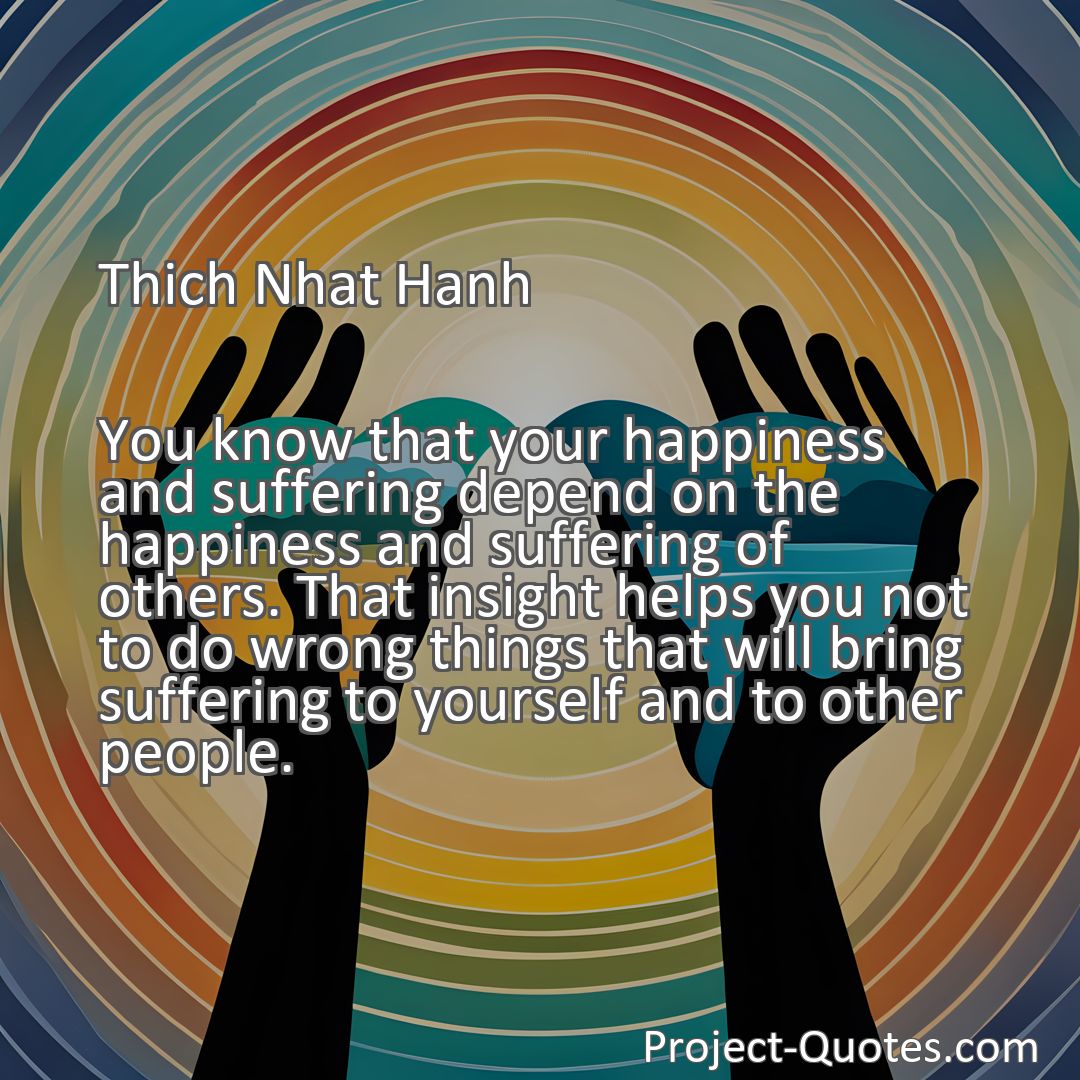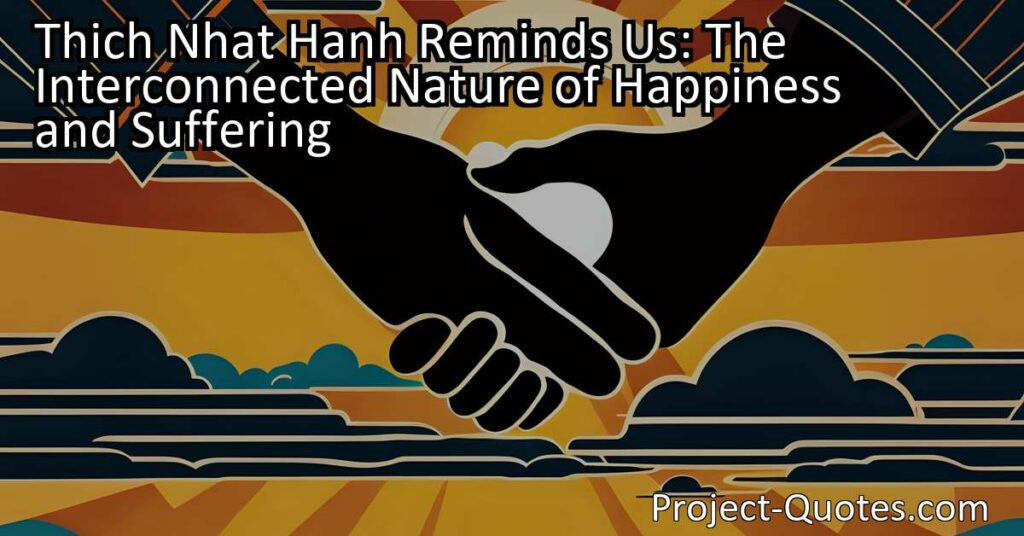You know that your happiness and suffering depend on the happiness and suffering of others. That insight helps you not to do wrong things that will bring suffering to yourself and to other people.
Thich Nhat Hanh
Thich Nhat Hanh Reminds Us: The Interconnected Nature of Happiness and Suffering Thich Nhat Hanh’s wise words remind us that our happiness and suffering are interconnected with those of others. By understanding this interdependence, we can make choices that bring positive outcomes for ourselves and the people around us. Let us strive to be mindful of our impact on others and create a world where happiness flourishes and suffering diminishes.
Table of Contents
- 1 You know that your happiness and suffering depend on the happiness and suffering of others. That insight helps you not to do wrong things that will bring suffering to yourself and to other people.
- 2 Thich Nhat Hanh
- 3 Meaning of Quote – You know that your happiness and suffering depend on the happiness and suffering of others. That insight helps you not to do wrong things that will bring suffering to yourself and to other people.
- 4 Freely Shareable Quote Image
- 5 Related
Meaning of Quote – You know that your happiness and suffering depend on the happiness and suffering of others. That insight helps you not to do wrong things that will bring suffering to yourself and to other people.
In our journey through life, we often focus solely on our own happiness and disregard the impact our actions and decisions may have on the happiness and suffering of others. However, the wise words of Thich Nhat Hanh remind us of a fundamental truth: our own happiness and suffering are intertwined with those of others. This profound insight should guide us towards making choices that bring about positive outcomes not only for ourselves but also for the people around us.
When we acknowledge the interconnectedness of our emotions and experiences, it becomes clear that our actions have the power to either bring happiness or inflict suffering upon ourselves and others. Imagine a situation where we gossip about a classmate, spreading rumors and causing them emotional pain. While we may find temporary satisfaction in the act of gossiping, it ultimately creates a hostile and negative atmosphere for everyone involved. Our classmate, who becomes the target of our gossip, not only feels hurt and isolated but may also retaliate, perpetuating a cycle of negativity.
On the other hand, understanding that our happiness depends on the happiness of others encourages us to act with kindness and compassion. By promoting a positive and supportive environment, we not only uplift those around us but also create a space for our own growth and contentment. A simple act of kindness, such as helping a classmate with their schoolwork, can foster cooperation, friendship, and a sense of belonging for both parties involved. In turn, this can lead to improved academic performance, increased self-confidence, and a fulfilling social life.
Moreover, our ability to empathize with others allows us to recognize and avoid actions that may bring suffering to ourselves and those around us. Let us consider a scenario where we are tempted to join a group of peers who engage in harmful behavior, such as bullying or substance abuse. Understanding the interconnectedness of our happiness prompts us to reflect on the consequences of our actions and the effects they may have on ourselves and others. We realize that participating in such activities not only brings potential harm to others, but it also undermines our own well-being in the long run. By making the conscious decision not to engage in harmful behavior, we open ourselves up to healthier relationships, personal growth, and a future free from regret.
Often, it is easy to lose sight of the connectedness of our emotions and actions amidst the complexities of daily life. We may become so absorbed in our own desires and pursuits that we forget the impact our choices can have on those around us. However, this quote reminds us that even the smallest choices we make can reverberate and shape the world we inhabit. Therefore, it is imperative that we approach every decision with mindfulness and consideration for the happiness and suffering of others.
In addition to guiding our actions, being mindful of the interconnected nature of happiness and suffering can also significantly enhance our relationships. When we recognize that our actions and words have the power to influence the emotional well-being of others, we become more attentive and empathetic listeners. By truly hearing and understanding the joys and struggles of our friends, family, and classmates, we can offer them the support and guidance they need. This, in turn, strengthens our connections with loved ones, fostering an environment of trust, collaboration, and mutual respect.
Moreover, recognizing the interdependence of our happiness and suffering allows us to cultivate a greater sense of gratitude for the positive aspects of our lives. When we acknowledge that our own happiness is inseparable from the happiness of others, we develop a deep appreciation for the love, support, and kindness we receive from those around us. By expressing our gratitude and reciprocating their kindness, we reinforce the cycle of positivity, creating a harmonious and uplifting atmosphere for all.
In conclusion, the words of Thich Nhat Hanh remind us of the profound interconnection between our happiness and suffering and that of others. By understanding that our actions and choices shape not only our own well-being but also that of the people around us, we can navigate through life with greater mindfulness and compassion. Through acts of kindness, empathy, and respect, we can create a world where happiness flourishes and suffering diminishes, fostering a community where everyone thrives. Let us strive to be mindful of the impact we have on others, forging a path towards a brighter, more interconnected future.
I hope this quote inspired image brings you hope and peace. Share it with someone who needs it today!


